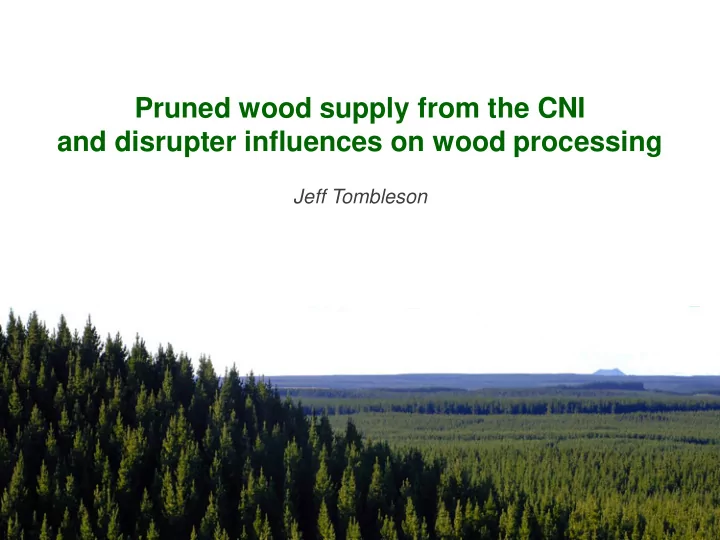

Pruned wood supply from the CNI and disrupter influences on wood processing Jeff Tombleson
Forest Management Practices The only constant is change ! Sale of State forest assets purchased largely by TIMOs Spotted owl, unprecedented log price spike, and new land planting boom Changes of corporate forest ownership and loss of vertical integration All complicated by a foresters planning time horizon of 28 years and a sawmillers of 12mths
“Maximisation of volume and value are mutually exclusive”
“Volume is a surrogate for value”
Merits of a high volume / high value per hectare regime Much higher volumes of wood per hectare No pruning cost to carry Shorter rotation lengths
To justify continuance of a pruned regime: A price differential between pruned and structural of $80.00 m 3 or much more Such a differential may never have been achieved since the 1993/94 log price spike During the past ten years the differential has been around $40.00 m 3 Would a sawmill invest for an uncertain return in 20 years? The issue is “pruned log price” – and “price” alone
25 years of market development and investment in wood processing
The looming concern for the CNI pruned log mills Little or no business opportunity to change the business to sawing structural or pursuing remanufacturing
The Study Pruned log mills provided the following information: Total quantity of pruned logs sawn annually? Pruned log forest source and quantity? Total employees? Annual turnover? Results are GENERAL to protect the detailed individualised data provided
The Study Forest Owners/Managers provided the following information: Reconciliation of total consumption against supply taking into account any pruned log exports Pruned log forecasts Where necessary Results are GENERAL
Pruned logs are categorised as being supplied by: Kaingaroa Timberlands Taumata Medium forests Small scale growers
Results The CNI currently contains: 12 pruned log mills Processing 1.226 million m 3 of pruned logs annually Employing 1,575 staff Annual turnover of $734 million
Quantification and source of CNI pruned logs processed domestically 2017
Forecasting pruned log supply for the next 13 years to 2030 Kaingaroa Timberlands Taumata Medium forests (x18) ❖ All the above supply little or no pruned logs to export
Forecasting pruned log supply for 13 years to 2020 Small scale growers ▪ Average of 5,000 ha was planted between 1992 and 2002 ▪ Assumption that the average harvest age is 25yrs ▪ And 60% of the pruned logs are sold domestically
Pruned Log Forecasts 2017 - 2030
Pruned Log Forecasts 2017 - 2030
Pruned Log Forecasts 2017 - 2030
Pruned Log Forecasts 2017 - 2030
Pruned Log Forecasts 2017 – 2030 & projected to 2037
Will the remaining CNI forest estate continue to be pruned? Generally - Yes
2037 is 20 years - or a generation away In 1996 when the Millennium regime was instigated who would have believed that 20 years later That up to 70% of the harvest would be exported, and up to 70% sold to China That China would embark on a city and infrastructure spend of $2 billion/day That NZ would be the leading supplier of logs into China and that China would be paying 20-year record prices for these logs That this infrastructure build would consume more concrete in a three -year period than what the USA poured in the last 100 years That China’s concrete construction is the instigator of NZs forestry’s current increased prosperity
2037 is 20 years - or a generation away So what might change and where’s the next mega demand for CNIs radiata pine? Climate change and rising sea levels ▪ Raising and/or migration of infrastructure ▪ The next mega demand for CNIs wood ▪ supplied as lumber via some district based super mills Predicting disrupters/opportunities 20 years out in 2037 is not possible or any more than in 1996 at the instigation of the Millennium regime. Regrettably whatever new market opportunities that may arise it wont be the saviour of the pruned log mills
Conclusions Changing management practices & age class structure is more than a disrupter The 30% pruned log reduction by 2020 will challenge some mills Further reduction of around 70% in 2037 will commercially compromise most of the pruned log mills 2037 is 20 years away. Emergence of large scale export knotty lumber markets would be welcomed but of no assistance to pruned log mills … “This is what the data says” …”and such is the business of forestry” until the next market ..ideally a mega market demand for knotty lumber ……… field day
Recommend
More recommend